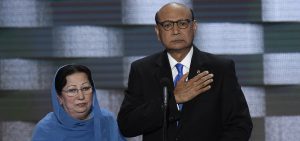Silence Can Be Golden

What’s omitted from a discussion can sometimes speak quite loudly. And sometimes quite disturbingly. That’s true, I think, about the national conversation about the Khizr and Ghazala Khan/Donald Trump contretemps.
Unless you’ve been summering in the Australian outback and off the grid, you likely know that the most memorable moment of the Democratic National Convention (at least if the idea of a woman presidential nominee somehow didn’t make you swoon) was the speech delivered by the aforementioned Khizr Khan, a Pakistani-born, Harvard Law School-educated American citizen. Mr. Khan has worked in immigration and trade law, and founded a pro bono project to provide legal services for the families of soldiers. The Khans’ son, Humayun, an Army captain, was killed in 2004 while protecting his unit.
At the convention, Mr. Khan identified himself and his wife, who stood at his side, as “patriotic American Muslims,” and sharply condemned Donald Trump for what the Khans see as his bias against Muslims and divisive rhetoric. “You have sacrificed nothing,” he added, addressing Mr. Trump, “and no one.”
Mr. Trump, in subsequent interviews, responded to that accusation by arguing that he had raised money for veterans, created “tens of thousands of jobs, built great structures [and] had tremendous success.” And he also speculated that the reason Mrs. Khan hadn’t spoken was because, as a Muslim, “maybe she wasn’t allowed to have anything to say. You tell me.”
Mrs. Khan explained her reticence in a Washington Post essay. “Walking onto the convention stage, with a huge picture of my son behind me,” she wrote, “I could hardly control myself. What mother could?”
The punditsphere went wild, mostly with applause for the Khans and derision for Mr. Trump. There were the expected right-wing “exposés” of the Khans’ (nonexistent) connections to terrorist organizations, but the responsible responses to the showdown were critical of the Republican candidate and sympathetic to the Gold Star parents.
But while there is no reason to doubt Mrs. Khan’s claim that she was just too anguished by the memory of her son to speak, something that should have been considered somewhere in all the seeming millions of words that were produced on the row simply wasn’t.
That would be the possibility that a woman might choose, for religious reasons, to not avail herself of center stage and a microphone. All sides of the controversy seem to have agreed to the postulate that tznius is a sign of backwardness, or worse.
That was unarguably the upshot of Mr. Trump’s infelicitous insinuation, that Mrs. Khan’s silence at the convention was religious in nature, and evidence that Islam is intolerant and repressive.
To be sure, there are sizable parts of the Islamic world where women are in fact cruelly oppressed, where physical abuse, forced marriages and “honor killings” are unremarkable. But what Mr. Trump was demeaning was the very concept of different roles for men and for women, the thought that a woman might, as a matter of moral principle, wish to avoid being the focus of a public gathering. He was insinuating, in other words, that a traditional idea of modesty is somehow sinister.
Islam, though some Muslims may chafe at the observation, borrowed many attitudes and observances from the Jewish mesorah. Islam’s monotheism and avoidance of graven images, its insistence on circumcision, its requirement for prayer with a quorum and facing a particular direction, its practice of fasting, all point to the religion’s founder’s familiarity with the Jews of his time. As does that faith’s concept of tznius, even if, like some of its other borrowings, it might have been taken to an unnecessarily extreme level.
I don’t know the Khans’ level of Islamic observance, but Mrs. Khan wore a hijab as she stood next to her husband at the convention podium. So it is certainly plausible that her decision to not speak in that very public venue may have been, at least to a degree, informed by a tznius concern.
A concern that the plethora of pundits chose to not even consider, thereby, in effect, endorsing Mr. Trump’s bias on the matter.
To be sure, and most unfortunately, tznius isn’t an idea that garners much respect in contemporary western society. Moreover, Mr. Trump’s relationship with any sort of modesty is famously fraught.
But it is particularly disturbing that his insinuation that traditional roles for men and women bespeak repression and backwardness went missing in the national discussion, altogether unchallenged by the ostensibly open-minded men and women of the media.
© 2016 Hamodia



Recent Comments